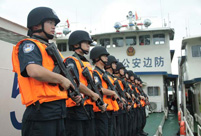MOSCOW, Dec. 20 (Xinhua) -- It might be the snowiest winter for Edward Snowden.
Facing "unchanged" espionage charges back in his home country, Snowden, who was stranded in the transit zone of a Moscow airport for nearly six weeks before receiving temporary asylum, almost broke trust between the United States and its European allies like Germany.
No one, even Snowden himself, can say for sure why the 30-year-old analyst leaked, as U.S. National Security Agency (NSA) Chief Keith Alexander said in November, up to 200,000 classified documents to the media.
Yet, the repercussions were substantial, and apparently to sustain.
TOUGH YEAR FOR UNCLE SAM
Since the first publication in June by The Guardian newspaper, millions of Americans, most of whom for the first time, found themselves exposed to a mass intelligence program code-named PRISM.
More classified information, involving the participation of major U.S. telecommunications companies, was revealed after Snowden arrived at Moscow's Sheremetyevo International Airport.
The United States was quick enough to bring three felony charges against Snowden, namely conveying classified information to an unauthorized party, disclosing communications intelligence information, and theft of government property.
Meanwhile, the U.S. civil society, as well as political groups, were divided on whether Snowden was a traitor of the nation or hero for individual rights.
The heated discussion, along with globally lengthy media coverage, has piled excessive pressure on U.S. President Barack Obama's administration, though it repeatedly attributed the massive tapping to anti-terrorism efforts, Russian experts say.
"Snowden's case made the entire world think whether the NSA and other secret services have crossed the line -- whether one more terrorist neutralized is worth the discomfort of a million law-abiding citizens," said Nikolai Fedotov, chief analyst in the Moscow-based InfoWatch Data Loss Prevention and Protection Corporation.
In a German parliament session in November, furious Chancellor Angela Merkel demanded clarification from Washington on alleged tapping of her private mobile phones over the last decade, and warned that the transatlantic free trade agreement between the United States and the European Union is currently, without doubt, being put to the test by the revelations that have been aired against Washington about the gathering of millions of bits of data.
Vladimir Yevseyev, director of the Center of Social and Political Research in the Russian Academy of Science, said: "We observe two communities aboard Western ship: one on the U.S. ship, where the crew is unhappy with the captain's omnipresence in their lives."
"The other one is on European ship, whose crew has been equally irritated with the Big Brother's surveillance," he told Xinhua.
The U.S. spying in Latin America also ruffled feathers. Brazilian President Dilma Rousseff canceled a planned visit to Washington in October and slammed the United States at an annual UN General Assembly meeting.

 People prepare for upcoming 'Chunyun'
People prepare for upcoming 'Chunyun'  Highlights of Beijing int'l luxury show
Highlights of Beijing int'l luxury show Record of Chinese expressions in 2013
Record of Chinese expressions in 2013 China's moon rover, lander photograph each other
China's moon rover, lander photograph each other 17th joint patrol of Mekong River to start
17th joint patrol of Mekong River to start Spring City Kunming witnesses snowfall
Spring City Kunming witnesses snowfall Heritage of Jinghu, arts of strings
Heritage of Jinghu, arts of strings Weekly Sports Photos
Weekly Sports Photos PLA elite units unveiled
PLA elite units unveiled  PLA elite units unveiled
PLA elite units unveiled  Chinese scientific expedition team
Chinese scientific expedition team  Heritage of Jinghu, arts of strings
Heritage of Jinghu, arts of strings The unchanged flavor of changing Beijing
The unchanged flavor of changing Beijing Miss Philippines crowned Miss International
Miss Philippines crowned Miss International Bolt throws down bus challenge in China
Bolt throws down bus challenge in ChinaDay|Week|Month